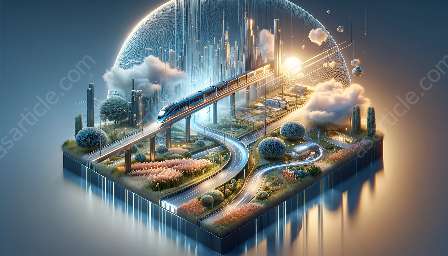Transport engineering is a multidisciplinary field that is crucial to the functioning of modern societies. It involves the design, construction, and maintenance of transportation systems, with a focus on ensuring efficient movement of people and goods.
Core Aspects of Transport Engineering
At its core, transport engineering encompasses a wide range of activities and concerns. Some of the fundamental aspects include:
- Transportation Infrastructure: This includes roads, highways, bridges, tunnels, railways, airports, and ports. Engineers in this field are responsible for designing, constructing, and maintaining these critical components of the transportation network.
- Traffic Engineering: The study of traffic flow, capacity, and operational characteristics of road networks. Traffic engineers analyze existing systems to optimize traffic flow and safety.
- Public Transportation Systems: Designing and managing public transit systems to ensure accessibility, efficiency, and sustainability. This includes buses, trains, and other forms of mass transit.
- Transportation Planning: Long-term strategic planning to address current and future transportation needs. This includes land use planning, environmental impact assessments, and infrastructure development.
- Intelligent Transportation Systems (ITS): Utilizing advanced technologies such as traffic signal control, electronic toll collection, and digital infrastructure to improve the efficiency and safety of transportation networks.
Technologies Driving Transport Engineering
The field of transport engineering is constantly evolving, driven by advancements in technology. Some of the key technologies that are shaping the future of transportation systems include:
- Autonomous Vehicles: The development and implementation of self-driving cars and trucks have the potential to revolutionize transportation, offering the promise of improved safety and efficiency.
- Smart Infrastructure: Integration of sensors, cameras, and data analytics into transportation infrastructure to enable real-time monitoring and optimization of traffic flow and safety.
- Electric and Hybrid Vehicles: The shift towards sustainable transportation is driving the development of electric and hybrid vehicles, which require new infrastructure and energy management systems.
- High-Speed Rail: Engineering advancements in rail systems are paving the way for high-speed trains, offering a sustainable and efficient alternative for long-distance travel.
- Aerial Mobility: The exploration of urban air mobility solutions, including drones and air taxis, to alleviate congestion and provide alternative transportation options.
Challenges and Opportunities in Transport Engineering
While transport engineering holds great promise for improving mobility and connectivity, it also faces a range of challenges, including:
- Environmental Impact: Transportation systems have significant environmental impacts, from carbon emissions to habitat fragmentation. Engineers are tasked with developing sustainable and eco-friendly solutions to mitigate these effects.
- Urban Congestion: The increasing urbanization and population density in cities are leading to severe congestion and traffic gridlock. Transport engineers must find ways to alleviate congestion through innovative design and planning.
- Infrastructure Resilience: Climate change and natural disasters pose threats to transportation infrastructure. Engineers need to design and build resilient systems capable of withstanding unforeseen events.
- Equitable Access: Ensuring that transportation systems are accessible to all members of society, including underserved communities and individuals with mobility challenges.
- Connected and Autonomous Vehicles: The integration of autonomous vehicles into existing transportation networks presents technical, regulatory, and societal challenges that must be addressed for widespread adoption.
Career Paths in Transport Engineering
Transport engineering offers a diverse range of career paths for aspiring professionals, including:
- Transportation Planner: Responsible for long-term strategic planning and policy development for transportation networks.
- Traffic Engineer: Focuses on optimizing traffic flow, safety, and efficiency within road networks.
- Infrastructure Engineer: Designs and maintains critical transportation infrastructure such as roads, bridges, and tunnels.
- Public Transit Manager: Oversees the planning and operation of public transportation systems, including buses and trains.
- ITS Specialist: Utilizes technology to enhance the efficiency and safety of transportation networks through digital infrastructure and data analysis.
- Sustainable Transportation Consultant: Works on developing eco-friendly and sustainable transportation solutions, such as electric vehicles and alternative fuels.
Transport engineering is a dynamic and critical field within the realm of applied sciences, shaping the way we move and connect with the world. Whether it's the development of groundbreaking technologies or the creation of resilient and sustainable transportation systems, transport engineers play a vital role in ensuring the continued evolution and improvement of our global mobility networks.







































